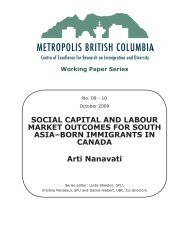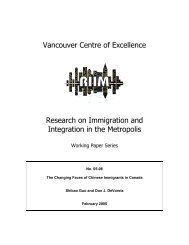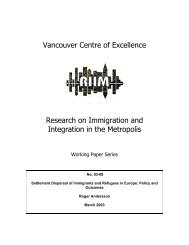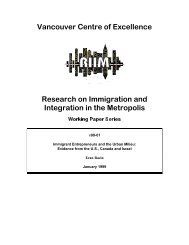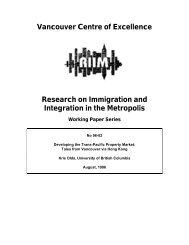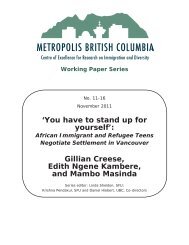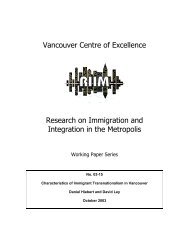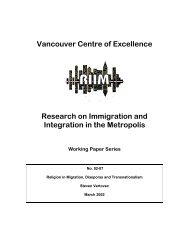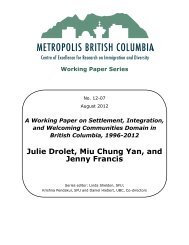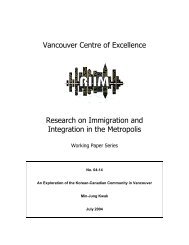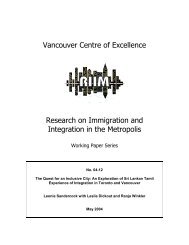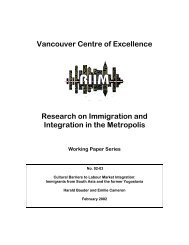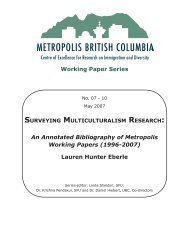Modernization and Global Restructuring of Women's Work
Modernization and Global Restructuring of Women's Work
Modernization and Global Restructuring of Women's Work
You also want an ePaper? Increase the reach of your titles
YUMPU automatically turns print PDFs into web optimized ePapers that Google loves.
3<br />
Introduction<br />
In the Spring <strong>of</strong> 1997, I joined an advisory committee whose m<strong>and</strong>ate was to introduce diversity<br />
issues within the North Shore health system in North Vancouver, British Columbia. My reason for<br />
joining the committee was to get a sense <strong>of</strong> the field site where I was going to spend a couple <strong>of</strong> years<br />
looking at the relationship between narratives <strong>and</strong> emotional well-being within the Iranian<br />
community. During the first meeting, I met Nadia, an Iranian woman in her late forties who had<br />
joined the committee for a different reason. Nadia had been in Canada for six years <strong>and</strong> was looking<br />
for work in her pr<strong>of</strong>essional area <strong>of</strong> oncology <strong>and</strong> for her joining a health committee seemed to be a<br />
logical step. During my subsequent meetings with Nadia, I learnt that other than her vigorous search<br />
for work, she was seeking answers to one particular question: Why is it so difficult for an Englishspeaking<br />
Iranian pr<strong>of</strong>essional to work in Canada? She noted that the Canadian embassy had told her<br />
<strong>and</strong> her husb<strong>and</strong> (an engineer) that “there would be no problems in them getting work in Canada.” In<br />
this paper I give a long answer to her question. I show that the answer cannot merely be linear; it<br />
must necessarily emerge from the particular genre <strong>of</strong> storytelling with its multi-faceted potential for<br />
capturing the voices <strong>of</strong> the participants at many levels. Nadia had her own reason for sharing her<br />
story with the reader: she wanted people to recognize her humanity, an issue that arises in a situation<br />
when one’s basic rights to work <strong>and</strong> to live with dignity are denied.<br />
As I began to think through the story Nadia related to me over a period <strong>of</strong> fourteen months,<br />
the analytical paradigm <strong>of</strong> “intersectionality” came to mind; the script <strong>of</strong> this well-established<br />
paradigm requires us to examine the interactive oppression <strong>of</strong> “race,” gender <strong>and</strong> class. But this is not<br />
the whole story <strong>and</strong> can never be if we want to pay close attention to the lived realities <strong>of</strong> people. A<br />
race/gender/class paradigm is limiting as it is grounded in the divisive Cartesian epistemology that<br />
invariably focuses on one category to the exclusion <strong>of</strong> others. Literature on race/ethnicity does not as<br />
a matter <strong>of</strong> course include gender issues <strong>and</strong> likewise a focus on gender does not always take into<br />
account the class status <strong>of</strong> women. Furthermore this paradigm leans heavily towards a victimization<br />
<strong>of</strong> individuals with little room for human agency. My intent here is not to undermine the value <strong>of</strong> this<br />
interdisciplinary paradigm in unmasking oppressive systems <strong>of</strong> power but to take one more step<br />
towards capturing the lived reality <strong>of</strong> women as this comes to light in the stories <strong>of</strong> women.<br />
The scenario <strong>of</strong> “the myriad/small voices in civil society” (Guha 1980) suggests how<br />
individuals shape <strong>and</strong> are shaped by larger social, political <strong>and</strong> economic structures. I argue that it is<br />
within this latter context that the impact <strong>of</strong> the race/gender/class paradigm on the lives <strong>of</strong> women can<br />
fully be understood. Both the scenarios – intersectionality <strong>and</strong> small voices – respond to Nadia’s<br />
question as to why she is not able to find work in Canada; the small voices paradigm will help us (the



